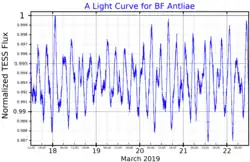BF Antliae
BF Antliae, or HD 86301, is a variable star in the southern constellation of Antlia. It has a baseline apparent visual magnitude of 6.32,[3] which indicates it lies near the lower limit of visibility for faint stars. The distance to BF Ant, as determined from its annual parallax shift of 6.9 mas,[2] is 473 light years. It is moving further away with a heliocentric radial velocity of +18 km/s.[5]
| Observation data Epoch J2000 Equinox J2000 | |
|---|---|
| Constellation | Antlia |
| Right ascension | 09h 56m 54.09215s[2] |
| Declination | −27° 28′ 30.5575″[2] |
| Apparent magnitude (V) | 6.32 (+0.01)[3] |
| Characteristics | |
| Spectral type | A4 V[3] |
| B−V color index | 0.173±0.008[4] |
| Variable type | δ Sct[3] |
| Astrometry | |
| Radial velocity (Rv) | +18.2±0.8[5] km/s |
| Proper motion (μ) | RA: −72.627[2] mas/yr Dec.: +23.234[2] mas/yr |
| Parallax (π) | 6.8977 ± 0.0578 mas[2] |
| Distance | 473 ± 4 ly (145 ± 1 pc) |
| Absolute magnitude (MV) | 0.33[4] |
| Details[6] | |
| Mass | 2.41±0.05 M☉ |
| Luminosity | 66.8+11.7 −10.0 L☉ |
| Temperature | 7,745+53 −71 K |
| Rotational velocity (v sin i) | 218.9±1.7[7] km/s |
| Other designations | |
| Database references | |
| SIMBAD | data |
This is an A-type main-sequence star with a stellar classification of A4 V[3] that is at the end of its main sequence lifespan.[6] It is a Delta Scuti variable that varies by 0.01 of a magnitude.[3] These are short-period (six hours at most) pulsating stars that have been used as standard candles and as subjects to study astroseismology.[9] Handler and Shobbrook (2002) noted that the star lies near the "hot luminous border of the δ Scuti instability strip", and it appears "multiperiodic with a time scale of 3.8–6 hours".[10]
BF Antliae is spinning rapidly with a projected rotational velocity of 219 km/s.[7] It has 2.41 times the mass of the Sun and is radiating 67 times the Sun's luminosity from its photosphere at an effective temperature of 7,745 K.[6]
References
- "MAST: Barbara A. Mikulski Archive for Space Telescopes". Space Telescope Science Institute. Retrieved 8 December 2021.
- Brown, A. G. A.; et al. (Gaia collaboration) (August 2018). "Gaia Data Release 2: Summary of the contents and survey properties". Astronomy & Astrophysics. 616. A1. arXiv:1804.09365. Bibcode:2018A&A...616A...1G. doi:10.1051/0004-6361/201833051.
- Chang, S.-W.; et al. (2013), "Statistical Properties of Galactic δ Scuti Stars: Revisited", The Astronomical Journal, 145 (5): 10, arXiv:1303.1031, Bibcode:2013AJ....145..132C, doi:10.1088/0004-6256/145/5/132, S2CID 118900730, 132.
- Anderson, E.; Francis, Ch. (2012). "XHIP: An extended hipparcos compilation". Astronomy Letters. 38 (5): 331. arXiv:1108.4971. Bibcode:2012AstL...38..331A. doi:10.1134/S1063773712050015. S2CID 119257644.
- de Bruijne, J. H. J.; Eilers, A.-C. (October 2012), "Radial velocities for the HIPPARCOS-Gaia Hundred-Thousand-Proper-Motion project", Astronomy & Astrophysics, 546: 14, arXiv:1208.3048, Bibcode:2012A&A...546A..61D, doi:10.1051/0004-6361/201219219, S2CID 59451347, A61.
- Zorec, J.; Royer, F. (2012), "Rotational velocities of A-type stars. IV. Evolution of rotational velocities", Astronomy & Astrophysics, 537: A120, arXiv:1201.2052, Bibcode:2012A&A...537A.120Z, doi:10.1051/0004-6361/201117691, S2CID 55586789, A120.
- Díaz, C. G.; et al. (July 2011), "Accurate stellar rotational velocities using the Fourier transform of the cross correlation maximum", Astronomy & Astrophysics, 531: A143, arXiv:1012.4858, Bibcode:2011A&A...531A.143D, doi:10.1051/0004-6361/201016386, S2CID 119286673.
- "BF Ant". SIMBAD. Centre de données astronomiques de Strasbourg. Retrieved October 19, 2018.
- Templeton, Matthew (16 July 2010). "Delta Scuti and the Delta Scuti Variables". Variable Star of the Season. AAVSO (American Association of Variable Star Observers). Retrieved 5 September 2015.
- Handler, G.; Shobbrook, R. R. (June 2002), "On the relationship between the Delta Scuti and Gamma Doradus pulsators", Monthly Notices of the Royal Astronomical Society, 333 (2): 251–262, arXiv:astro-ph/0202152, Bibcode:2002MNRAS.333..251H, doi:10.1046/j.1365-8711.2002.05401.x, S2CID 119062757.
